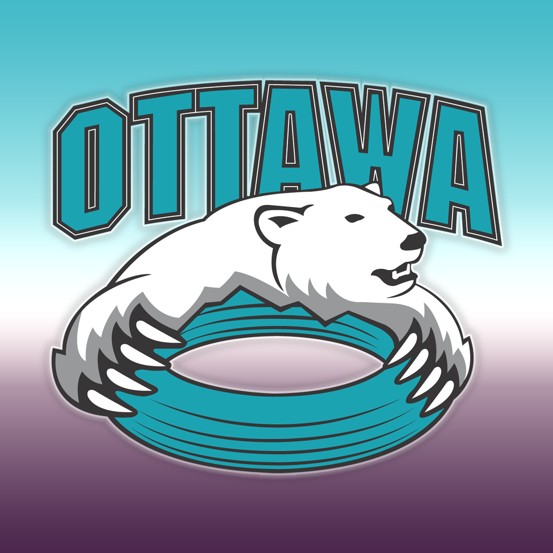
“It’s important because it gives young girls courage and inclusiveness. It teaches girls to be brave and not be scared if they don’t have experience on ice, especially those participants that are of different nationalities.”
– Maha Alsousi, parent of a participant
Socio-economic factors can be significant barriers to sport participation for many kids and their families. City of Ottawa Ringette Association (CORA), through its Breaking Down Barriers – Learn to Play Ringette program, is creating a space for children who face cultural, language, financial and transportation barriers to sport.
The Breaking Down Barriers program – a combination of learn to play and learn to skate programs – was developed last year, but CORA was unable to host it due to Covid-19. This program is a subset of the organization’s Ringette For All program, designed to engage children with physical and cognitive disabilities in sport.
The 12-week Breaking Down Barriers program finally began this fall, hosting 17 participants ranging from five to 15 years old. Participants spend an hour a week on the ice, becoming familiar with the rules of ringette.
“We’ve been talking about how traditional sports don’t reflect Canada’s diversity and multi-culturalism for a few years. It was time to stop talking about it and do something,” said Phyllis Bergmans, President of CORA. “We wanted to build a Learn to Play Ringette program for children from underrepresented and diverse socio-economic groups to give them an opportunity to get on the ice and try out the game that we love so much.”
The program is provided free of charge, including ice time, equipment and transportation for those who require it. CORA also brings in professional skating instructors to assist the dedicated volunteers with the skating instruction.
Families of participants have highlighted various aspects of the program that make it particularly appealing. From the program’s inclusiveness to the sport’s uniquely Canadian feel, Bergmans has received very positive feedback.
“I like the idea that this program was initiated to empower girls and how it’s inclusive,” said Maha Alsousi, whose 12-year-old daughter Laya recently joined the program. “I’m very happy to see people from all races given the opportunity to learn this great sport.”
“She gets great support from the volunteers on ice during practice and this has given her the confidence to keep trying to better herself on ice,” said Alsousi of her daughter, who was diagnosed with type-1 diabetes before she turned two. “Once she is on ice she forgets about her diabetes and feels like she is just as any other participant and is able to learn ringette.”
Alsousi heard about the program through her niece’s school. Her brother enrolled her 5-year-old niece and shortly after Laya wanted to join as well. She has now attended two sessions and is enjoying her experience despite her minimal skating experience.
“It’s important because it gives young girls courage and inclusiveness. It teaches girls to be brave and not be scared if they don’t have experience on ice, especially those participants that are of different nationalities,” said Alsousi. “I would like to thank the CORA association for running this program and hope to see similar programs open up for other sports as well.”
Going forward, the goal of the Breaking Down Barriers program is to have participants join an age or level appropriate division next season and host a new set of 15-20 participants in the Breaking Down Barriers program.
The program relies on donations, grants and fundraisers to provide free access to sport. As skaters graduate out of the program, some will need additional financial assistance to participate in other program, making help from organizations like Jumpstart even more important.
“These kids are amazing. They want to be athletes. They want to get better. They want to participate in sport. Their enthusiasm is contagious,” said Bergmans. “They will bring their love of the game into their schools, their communities, their families.”
“We are thrilled to be recognized,” said Bergmans of CORA’s program being nominated for the Ottawa Sport Council’s Community Sport Hero. “We hope that our story of the development of this program will allow other sport organizations to consider doing the same for their sport.”